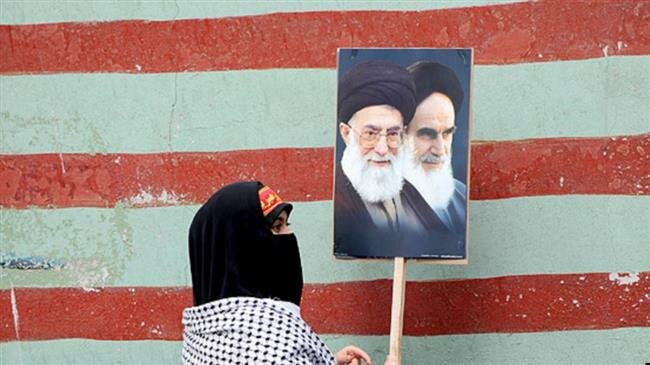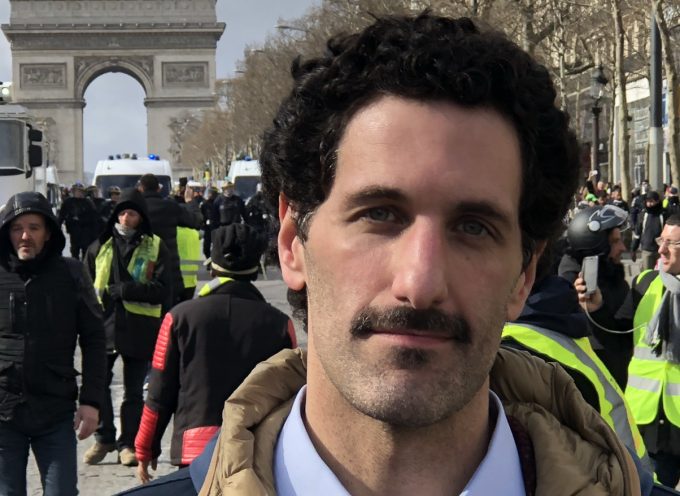
An Iranian woman displays the images of Leader of the Islamic Revolution Ayatollah Seyyed Ali Khamenei and Founder of the Islamic Republic Ayatollah Ruhollah Khomeini outside the wall of the former U.S. Embassy in Tehran. (File photo)
(Image by Press TV) Details DMCA
Sanctions on Khamenei? Ending the myth of the 'Millionaire Mullah' (Part 2/3)
Part 1 of this article discussed why the recent US sanctions on Supreme Leader Ali Khamenei provoked laughter in Iran, and derision even from Iranophobic Western mainstream media.
Beyond Khamenei, I can very briefly explain how and why the West can persist with their "Millionaire Mullah" mythology:
There are many economic principles that guide the Iranian economy which have no basis in the West they are, after all, "revolutionary". Many are based on principles of Islamic charity and of Islamic finance; many are also based on anti-capitalist principles which were obviously drawn from 20th century socialism. There are almost too many to list, but in Part 2 of this 3-part article I will pick a few key ones which specifically relate to clergy, and which - when added with Iranophobia - create such widespread and ignorant propaganda.
One of the five pillars of Islam is to give to charity (zakat), but one of the five additional pillars of Shia theology is that businessmen must give 20% of their profits to charity (khums). Thus, it should be clear why some say that Iran has an "alms-based economy". That's an exaggeration, because there are state taxes as well, but this money goes directly to religious authorities and has gone there for over 1,000 years.
For example, Khamenei was raised in a family (lower middle class clerics on both sides of his parents) which would have never received this money directly - they would have been the recipients of this charity from much higher-ranking clergy.
Khamenei, through hard work, sacrifice and other virtues, is now a "Marja'" (top religious authority). He now heads various religious foundations which receive and redistribute downwards this zakat and khums money.
Of course, he heads these foundations, but this money cannot (and is not) be used by him to by a Ferrari for his favourite nephew, for example. The Iranian press would die of happiness at the sales prospects caused by such a sensational, unheard-of event! These are "religious foundations" not "The Clinton Foundation": These foundations serve the poor - they do not trade high-level political access & favours in return for funding a jet-set lifestyle. Of course, most Western media cynically assume that everyone - even a Marja', and even a Marja' as publicly present as Khamenei secretly operates on shameless Western capitalist principles".
Let's clarify two key issues: zakat and khums are individual choices they are not compelled to go to Khamenei. Iranians can send their charity to a Marja' in Iraq if they like, and many do. Secondly, drastically changing this historic process of zakat and khums would certainly constitute a major revolution in Iran - however, for many it would constitute a rather "un-Islamic Revolution", and there is no doubt that the democratic majority wanted an "Islamic Revolution".
Therefore, Islamic charity is a reality of modern economics and finance in Iran. It is not something which non-Muslims can easily comprehend, perhaps, but the failure to do so will help fuel nonsense like "Millionaire Mullahs". Unlike neoliberalism in the West, these financial principles have the virtue of being democratically-supported, and I can easily argue that they have the additional virtue of far more efficiently increasing economic equality than neoliberalism does.
Khamenei, as the Supreme Leader, is also often listed as the head of companies simply out of respect by the company's founders. It is often purely honorary. Khamenei is not, for example, giving ideas on product improvement or production strategies to such companies (now the rare ex-president Rafsanjani - rare because he was an Iranian Islamic Revolutionary cleric from a rich, business-oriented background might have gotten involved, but Khamenei has evinced no such interest) and he is absolutely not in any control of the company's assets. He is there in name only as a sign of respect for him, Islam, Iran, etc. Of course, this is distorted/misunderstood by Western pro-capitalist papers.
The Iranian Islamic Revolution also did something which no doubt enrages Western imperialist-capitalists, and about which they have no desire to spread honest information: the revolution took a huge chunk of the factories and industries owned by the shah and his tiny coterie and gave them to charity.
These are called the bonyads, and they are an estimated 15-20% of the entire Iranian economy. A staggeringly revolutionary concept, no?
The bonyads are thus different from the Islamic charity I have described, and the Islamic foundations which administer that charity, because the bonyads were expressly charged with getting involved in economic production.
The bonyads are not designed for capitalist profit, but are co-operatives which exist to create low-cost goods and jobs for Iranians. This planned" inefficiency" in attaining maximum profit, but not in social cohesion and equality - is falsely branded as "corruption" by raging Western capitalists, sadly.
(Note: You can view every article as one long page if you sign up as an Advocate Member, or higher).





